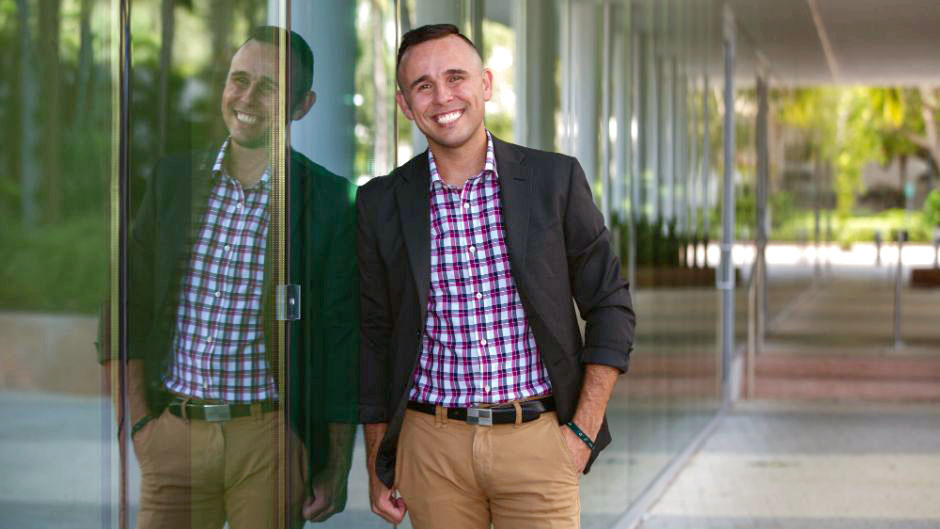Uneducated and imprisoned at 16 years old, Angel Sanchez had little or no chance of steering his life in a new direction. Still, his more senior mentors, who were incarcerated with him, helped begin a sea change for the Miami native.
Sanchez earned his GED while incarcerated in the Florida Department of Corrections, later obtained his college and law degree, and is a licensed attorney in the District of Columbia. Washington, D.C., one of several jurisdictions whose bar exam he was eligible to take and which transfers scores to many other states. He moved to Washington, D.C., earlier this year to work for the Department of Justice under a "Second Chance" fellowship for formerly incarcerated individuals to provide expert advice on criminal justice reform.
Sanchez was recently accepted as a candidate for a Master of Laws at Yale and Harvard Law Schools. He chose Yale to specialize his legal practice and academic scholarship on issues related to mass incarceration and collateral consequences.
Sanchez headlines event highlighting changes to Pell Grant application rules
Recently, Deputy Assistant Attorney General Amy L. Solomon of the Office of Justice Programs, Bureau of Justice Assistance Director Karhlton F. Moore, and Bureau of Justice Statistics Director Alex Piquero, who is on leave from his position as chair of the Department of Sociology & Criminology at UM, joined Assistant Secretary of Education Amy Loyd, corrections officials, current and formerly incarcerated individuals, reentry advocates and leaders from Miami Dade College and the Vera Institute of Justice at an event in Miami, Florida, to commemorate Second Chance Month.
The Second Chance Month event was led by Bureau of Justice Assistance Second Chance Fellow Sanchez, who celebrated the upcoming reinstatement of federal Pell Grant eligibility to incarcerated students. The 1994 crime bill banned people in prisons from receiving Pell funding. Still, eligibility was restored when the Free Application for Federal Student Aid Simplification Act became law in 2020, granting access to students in federal and state penal institutions and local and juvenile correctional facilities beginning in the 2023-2024 academic year.
"When I went to prison, the most I could achieve was a GED, but I was lucky to have older men who were Pell recipients before it was banned who mentored me and instilled in me the value of higher education," said Sanchez. "We did what we could to self-educate with shared textbooks and unaccredited correspondence courses paid by our families. I can only imagine the potential that will be unlocked with full Pell reinstatement. I have seen it many times—and I saw it again here in Miami—that people who once benefited from a second chance often go on to become second chance creators—trainers, mentors, employers, and beacons of inspiration. The restoration of Pell funding will give that same opportunity to hundreds of thousands of incarcerated individuals who will now, finally, have the audacity to follow where their aspirations lead."
The U.S. Department of Education launched the Second Chance Pell Experiment in 2015 to assess the feasibility of expanding Pell eligibility. More than 200 colleges from 48 states, Puerto Rico, and the District of Columbia have participated. The Bureau of Justice Assistance has supported technical assistance to colleges and corrections departments participating in Second Chance Pell. More than 700,000 incarcerated students are expected to be eligible for Pell funding when full reinstatement takes effect July 1. Research has found that access to education in prison lowers the odds of recidivating by 43% and saves up to $5 for every $1 spent.
"My immigrant parents taught me that if you worked hard and got an education, you could do great things in this country—and I believe that," said Sanchez. "But what I have come to also learn through my improbable journey is that if you use your education and hard work to serve others, you will not only do great things, but you will have greater opportunities presented to you and, more importantly, you will go from doing great things to being someone great in someone's life. Dr. King reminds me that everyone can be great because everyone can serve.
"From my parents to my friends in prison to Valencia Community College to the University of Central Florida to Miami Law, so many people believed in me even when I did not believe in myself and, in the face of many barriers, they fought for me allowing me to be where I am today. My job is to do the same for someone else in my little corner of the world," said Sanchez.

